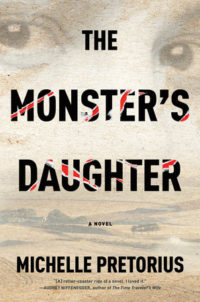The numbness didn’t happen all at once
 The Monster’s Daughter
The Monster’s Daughter
by Michelle Pretorius
My knowledge of the history of South Africa is a little sketchy, or at least it was before reading this book. But it’s so much more than a historical novel. This is genre-bending fare, combining crime, science fiction, social and political history – and it works.
The book opens with the discovery of a murder in a small town called Unie in 2010. The head of the police investigation, Sergeant Johannes Mathebe, is a straight player and he’s not getting on well with his recently appointed assistant Constable Alet Berg. She drinks, she swears and she resents being in this small town – a punishment for having an affair with one of the senior officers during her training.
The next chapter opens in 1901, in the midst of the Boer War. British troops are clearing out the Dutch farms, taking the people they find – mostly women and children – to concentration camps. A young woman called Anna is picked out from the Bloemfontein camp for something else, something worse, something that will echo through the next 109 years in its awfulness.
Pretorius holds back the link between the two timelines but the revelation isn’t really the point. I guessed the main link pretty early on and that in no way spoiled the read for me. It’s a very well written story that never feels preachy or textbooky despite touching on hugely contentious social and political issues and effectively sketching out just over a century of history.
Everyone’s race is described, which at first I found a little odd, but it gradually became clear that South Africa is a country where the idea of race being invisible is laughably optimistic. Race has defined so much of its recent history and Pretorius makes it clear that ending Apartheid did not put a neat end to those experiences. Racial tensions remain prevalent, with young and old quick to blame their own fate on the history of how their race has been unfairly treated.
The nature of South Africa’s recent history means this is often a brutal, violent book. I’m not a fan of brutality and sometimes flinched, but never found it incongruous or unnecessary. War is brutal, Apartheid was hateful, and terrorism/freedom fighting is violent, often desperate.
“The numbness didn’t happen all at once. It was like a spiral winding tighter and tighter as the days went on, crushing everything in his soul. War had changed the value of life for him. Everyone around him had become inconsequential puppets, obstacles to achieving his salvation. He went through the motions of being among them, following the rigid, ritualized code of behaviour that made it so easy to blend in, but he knew that he could put a bullet in any of their brains and feel nothing.”
What stops this from being the kind of violent novel that I don’t get on with? A few things. One: the wars are never described in the gung-ho, testerone-injected manner that riles me, though individual characters certainly adhere to that description. Two: the 2010 storyline about the murder investigation provides a break (as do the sections of the historical narrative that don’t focus on fighting) and also gives the narrative an urgency. Three: the science-fiction element (which is gradually revealed so I’m not going to explain it here) provides another break, but it also supplies another moral question that is tied up in, but also separate from, the rest of the narrative.
I should add that, although dark, this isn’t a relentlessly violent, horrific novel by a long way. There’s plenty of light too. There’s humour, friendship, romance as well as great, complex characters. Alet, for example, is a young woman who is a great detective but bad at playing the institutional game. She rubs people up the wrong way, she often lies to get access to information and has little respect for authority. It took me a while but I really grew to like her.
“Outside, a sliver of moon held court over bright stars. Back in Jo’burg she was barely able to see stars through the smog. They shone even brighter on the farms. Had the girl seen them as she was dying? Once the thought crept into Alet’s mind, she couldn’t stop.”
In fact, there are a lot of characters. Between some changes of name and multiple generations of some families, I sometimes got confused about who people were. Perhaps I should have made notes.
But on the whole I loved this debut novel and look forward to what Michelle Pretorius does next.
Published July 2016 by Melville House.
Source: An advance copy was kindly supplied by the publisher in return for an honest review.